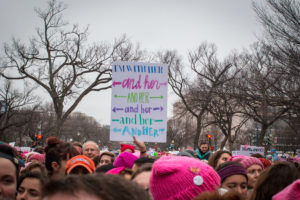In August, the Trump administration imposed a new set of rules governing how schools, colleges and universities are supposed to handle sexual assaults on campus.
U.S. Secretary of Education Betsy Devos’ new regulations replaced the Obama administration’s rules under Title IX, a federal law that for decades has governed issues of sex discrimination, including sexual assault, on campus.
“Today marks a new era in the storied history of Title IX in which the right to equal access to education required by law is truly protected for all students,” DeVos said in a statement. “Every student should know that their school will be held accountable for responding to incidents of sexual misconduct and that it must treat all students fairly.”
According to the Washington Post, the Trump Administration’s rules include more protections for those accused of on-campus sexual assaults.
The new rules give the accused the rights to “a live hearing with multiple panel members,” the Post reported. At the hearing, the rules allow the accused to cross-examine an accuser and bar schools “from allowing one person [to] both investigate and judge complaints.”
As NBC News reports, the Obama-era rules defined sexual harassment as “unwelcome conduct of a sexual nature.” The new rules narrow the definition of sexual harassment: unwelcome conduct that is “severe, pervasive and objectively offensive” that it “denies a person equal access to the school’s education program or activity.”
Advocates for the accused have celebrated the new rules. But women’s rights and victim advocates argue the new rule is too easy on those accused of sexual assaults, and will thus discourage sexual assault victims to proceed with the complaint.

The Women’s March on Jan. 21, 2017 in Washington, D.C. (Image courtesy of GencoSidlePhotos/Creative Commons)
Danielle Samuel, CSUN’s Campus Care Advocate, said survivors may not feel comfortable disclosing a possible assault knowing that they may have to face cross-examination later.
“The process in of itself reporting is traumatizing,” Samuel said. “[The new regulation] provides a barrier for survivors coming forward with what happened for them or coming forward with an accusation.”
As sexual assaults continue to be one of the major issues on school campuses, Jenna Parker, partner at the law firm Hathaway Parker in Los Angeles, said she sympathizes with students who might not be able to afford a drawn-out hearing. However, Parker emphasizes the importance of maintaining protections and rights for those accused in sexual assault cases.
“Having seen so many of these cases,” Parker said, “it is very important to have a hearing and an opportunity for each side to cross-examine each other, to point out the flaws in each other’s cases. A lot of times that’s just as important to the accuser as it is to the accused.”
Though Parker said the federal regulations are helpful since they provide a uniform policy authorities can look into and rely on, she thinks universities should come up with a uniform policy for all misconducts so that attorneys don’t have to read each Cal State policy.
Sam Richman, Deputy Director of CSUN’s Equity and Diversity office, said the office has communicated with the CSUN community about the new regulations.
“Each time a student comes forward to our office with a complaint,” Richman said, “we will let the student know in the beginning what process their complaint will likely fall under and what that process will look like before they make the decision to move forward with an investigation.”
With the 2020 presidential elections coming up, Parker, Richman and Samuel agreed that even if Democrat Joe Biden is elected president, it’s unlikely he’ll be able to overturn DeVos’ regulations quickly. The new rules are likely to remain in effect for at least a year, they said.
The show was reported by the following team:
- Sammy Fernandes, reporter
- Samuel Novicki, reporter
- Brenda Saldana, anchor
- Jessica Vaughan, moderator
- Serim Yeo, reporter

 Tweet this Video
Tweet this Video Share on Facebook
Share on Facebook Share via E-mail
Share via E-mail

